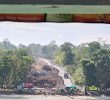“We came here not to destroy equipment or hurt people but to ask for justice,” Montecalvo said. “We are ready to defend our barricade,” he added.
By JOHN RIZLE L. SALIGUMBA
Davao Today
MACO, Compostela Valley, Philippines – After promising Pablo-stricken residents with rehabilitation last March 11, the foreign-owned Apex Mining Company Inc. (AMCI) has reversed its earlier decision, forcing victims to mount a protest barricade once again.
The barricade Monday prevented the entry of mining trucks and workers thus completely paralyzing operations at the mining firm. Some 300 protesters out of 2,000 protesters who mounted the barricade earlier in the day kept a night vigil to pressure the company to heed their demands.
Indug Kautawan (a Mansaka term for People Stand Up)-Masaralines, has demanded Apex to pay PHP 26-million worth of reparation. According to Juland Suazo of the environmental group Panalipdan, Apex earlier committed to put up a riprap to rehabilitate the river and to repair damaged roads and bridges. The firm also promised not to displace 42 families of small scale miners at the mine’s supposed expansion site.
During the protest barricade earlier in the day, Allan Montecalvo, spokesperson of Indug Kautawan, told davaotoday.com, “The last time they faced us they recognized that they were partly accountable for the devastation brought to us by Pablo. But now they are denying it.”
As far as the company is concerned, they already answered all issues, except for one: the organization’s demand for PHP 8.4M-worth of damages, which, according to AMCI spokesperson lawyer Connie del Rio, “is an unreasonable amount without validation.”
Del Rio, through a statement read before journalists, said though that AMCI “is willing to support and assist the victims’ needs” through their Socialized Management Development Fund.
To this, Montecalvo said, “We will accept (the assistance) only after they give us the reparation we demanded.”
The amount, he explained, was the estimated cost of the 84 houses that was damaged during the typhoon, when water from the Masara river swelled, causing heavy floods that swept the houses.
The overflowing of the Masara river, the group argued, was caused by the company’s dumping of earth excavated from the mountains to look for gold, a precious kind of element. Aside from the houses, crops and farm animals of the communities were also affected, as well as the bridge and riverways.
AMCI’s Del Rio expressed doubt over the number of damaged houses. She also said that “it’s unfair” that the company has been singled out to pay for the damages, saying “Pablo was the culprit after all.”
Coming to AMCI’s defense, a number of village chiefs here claimed that those whose houses were totally destroyed were already given help by the company.
“In our village, the houses that were totally destroyed were only 24 and the partially destroyed is 131. They were already listed to receive materials for the repair of their houses,” said Noemi Gadong, Malamodao village chief.
On Sunday morning, a day before the scheduled negotiation, 12 village captains of Masara Lines, along with IP Mandatory Representative Federico Gadong and Municipal Mayor Arthur Rimando held a meeting.
A resolution (No. 01, 2013) was filed and approved “conveying firm and strong support to Apex Mining Company, Inc….against all odds. Hereby conveying strong condemnation to the series of mass rally-demonstrations against the company duly organized and initiated by left-leaning groups who are not coming from Masara Lines.”
In a copy furnished to journalists, the resolution noted that the company “has been extending support to the community.”
Meanhile, Montecalvo said that they have showed the company a list of the location and owners with their signatures during the last negotiation.
“But today they are not interested about the list. We’ve only been to a few villages. The number of the affected individuals might be more should we include the other villages,” Montecalvo explained.
As the negotiation collapsed Monday, about 2,000 Pablo victims and support groups blocked the entry of company trucks carrying ores, thereby paralyzing the company’s operations.
AMCI, according to Del Rio, has already lost PHP 5M per day from the production stoppage because of the barricade. She, however, promised that they will implement “maximum tolerance.”
But Gadong dismissed that those who join the barricade are “hakot” and are not really from Maco.
Porperio Arnado, a resident of Purok 4-a in Elizalde village, denied the accusation.
“This is our decision and many are here because the government had promised many things to help us, but we have not received anything at all,” said Arnado.
Arnado added that their house was swept by floodwaters from the nearby Iho river. “We are hopeless. In fact we thank the groups that have helped us organize ourselves and fight for what is just,” he said.
“We came here not to destroy equipment or hurt people but to ask for justice,” Montecalvo said. “We are ready to defend our barricade,” he added.
AMCI has been extracting gold and silver for the last 40 years in Maco town, before the Crew Gold Corporation and the Mapula Creek Gold. Corp. took over its operations in 2005 when its Mineral Production Sharing Agreement covered 2,237 hectares, extendable to another 25 years. (John Rizle L. Saligumba/davaotoday.com)









